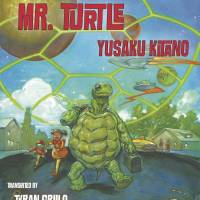Mr. Turtle wants to borrow a Philip K. Dick novel from a local Japanese library. But "Do Androids Dream of Electric Sheep?" is on loan, so he borrows a book on "The Making of Blade Runner." This scene from Yusuke Kitano's award-winning sci-fi novel "Mr. Turtle" sums up its narrative strategy: Don't tell the story, tell the stories under the story.
Mr. Turtle, by Yusaku Kitano, Translated by Tyran Grillo.
184 pages
Kurodahan, Fiction.
Kitano loves layers, and there are many to upturn in this deceptive tale of a cyborg turtle's existential awakening. Yes, it's full of Japanese sci-fi staples — an interplanetary war, mecha, wormholes, intergalactic trains — but the turtle's burgeoning AI blossoms far from the action, in mundane libraries, in warehouses, on suburban riverbanks.
First published as "Kame-kun," the story won the prestigious Nihon SF Taisho Award in 2001. It begins like a children's fable, with its frustratingly simple sentences, but things get stranger as we realize the story is being told by a narrator who only knows as much as the protagonist. Over the book's nearly 170 pages, Mr. Turtle's palimpsest consciousness — rewritten again and again, to erase his experiences as a solider in a war on Jupiter — begins leaking old memories: "He felt like he was bringing his face toward some watery surface ... so that he might gaze calmly on what was reflected there."
It's hard to think of a similar story about artificial intelligence that is as deceptively simple. And it's made all the more relevant 15 years later, thanks to Elon Musk, Google and those distant wars being waged by unmanned bird-like machines.

















With your current subscription plan you can comment on stories. However, before writing your first comment, please create a display name in the Profile section of your subscriber account page.